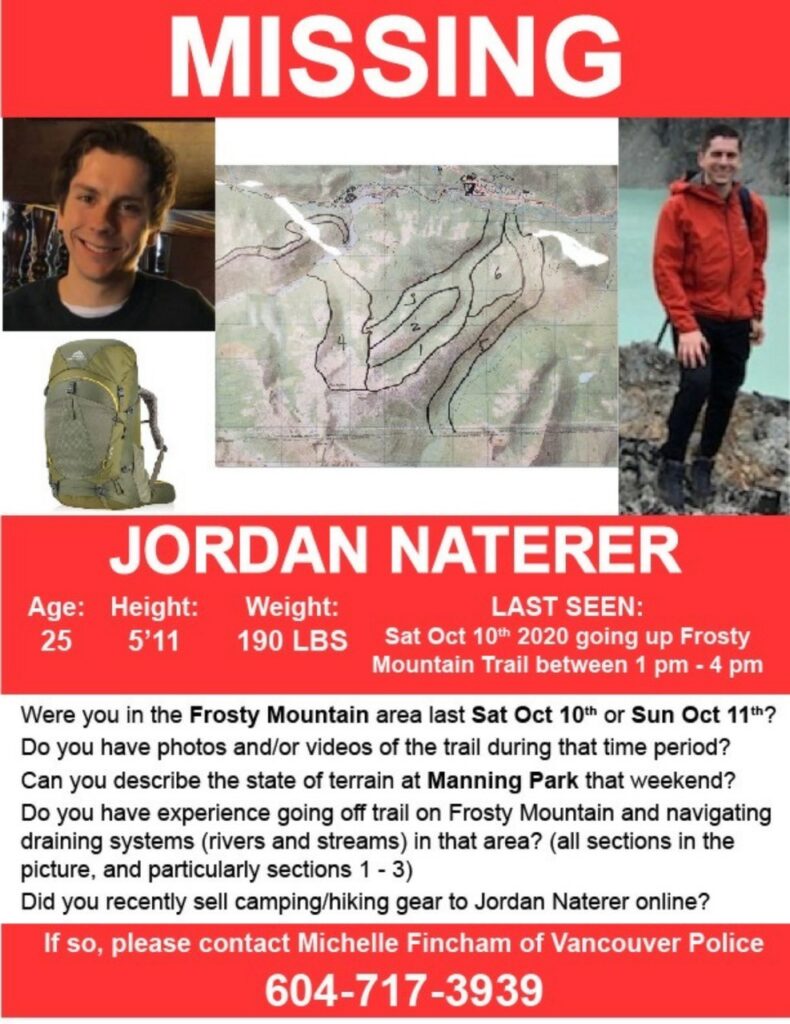Overcome by blizzard and terrain
Called by Mother Earth: A Father’s Search for His Son
by Greg F. Naterer
St. John’s: Breakwater Books, 2024
$24.95 / 9781778530142
Reviewed by Paul Geddes
*

On Saturday, October 10, 2020, twenty-five-year-old Jordan Naterer embarked on a solo overnight hike to view the autumn colours on the slopes of Frosty Mountain. This is an outing that dozens of hikers enjoy each season to experience the ancient larch trees as their needles change colour from summer green to autumn yellow, before losing their foliage for the winter months. This locale is 200 kilometres east of Vancouver in British Columbia’s E.C. Manning Provincial Park.
The North Cascade Mountains of British Columbia contain remote unmarked wilderness beyond what most outdoor enthusiasts ever experience. When the late afternoon temperatures unexpectantly dropped below freezing, Jordan was trapped at treeline in an early season snowstorm. Snow blown by strong winds caused him to become disoriented and lose the security of the established hiking trail he was following. Jordan had the necessary backcountry knowledge and outdoor gear to survive most situations, but ultimately this storm, combined with the complex off-trail terrain proved too much for him.
Jordan had been studying engineering at the University of British Columbia, far from his home on Canada’s east coast. By the time a phone call from his mother Josie went unanswered on Thanksgiving Monday a missing person report had already been made by Jordan’s friends, initially with the Vancouver Police and then including the RCMP. Greg and Josie arrived at Manning Park Resort on Wednesday.
With the involvement of local Search and Rescue (SAR) groups, an intense ground and air search was mounted which branched out further and further from where Jordan’s car was located in Manning Park on Tuesday, October 11th. After a week of searching and not finding any substantial clues the difficult decision was made to stand-down. Jordan would have been found by the police and SAR team search if he had been responsive. The harsh realization that survival at that point was extremely unlikely was explained to Greg and Josie. However, Jordan’s family was determined not to give up and with their own volunteers the search continued.

Eventually the deep early winter snows in the mountains of Manning Park put an end to further searching and on November 10th Greg and Josie Naterer returned home to regroup with Jordan’s adult siblings.The knowledge that the winter snowpack at elevation in Manning Park would not fully melt until early summer made Greg feel helpless and that he had abandoned his son.
Called by Mother Earth is an emotional account of the Naterer family’s search for their missing son. This book is not only a heartfelt story of Jordan’s parents’ grief but a guide to the many skills needed to conduct an effective wilderness search for a missing person using all available resources.
Planning a February return to the park occupied the family’s thoughts until Greg Naterer left home for the west. Offers of assistance raised from the missing person posters and the initial television and radio news reports were overwhelming. Greg was loaned a cabin to stay in at the Eastgate Park boundary and it became his volunteer search command centre to plan and document the daily search patterns. He quickly learned which volunteers to trust and which “volunteers” not to trust.
Greg and the volunteers had gained a firsthand knowledge of the rugged mountainous terrain within the boundaries of Manning Park. The lower trails above Highway 3 snake out through the cedar rain forest and the cell phone signals quickly fade away. The park covers a vast wilderness area bordering on Washington State to the south. Steep rock-strewn alpine slopes and uncharted creek drainages are some of the main challenges inhibiting a straightforward search pattern.
Volunteers more skilled than Greg accompanied him most days to ensure his safety as he learned the snowshoeing skills necessary to travel the snow-covered slopes of the search zones. The value of volunteer dedication is remembered throughout the pages of this story. The relatively new technology of drone cameras proved useful in this search. Over the many months of the family’s search for Jordan countless hours of devoted volunteer time were spent studying the images produced from drones.

As the daily searches started up again in February, Greg reached out to the local Indigenous community for guidance. An hour east of the park, members of the Upper Similkameen Indigenous community of Hedley provided Greg with the support he needed to enrich his growing understanding of the natural world, how to respect and work with nature and how to sense Jordan’s presence.
The chapters of this book follow the long days as Greg and his volunteers traversed 1,600 km on and off the trails, guided by Mother Earth. When the spring days lengthened in April and the snow started melting, mountaineers and rock climbers provided their expertise by searching where the terrain turned into vertical cliffs. By May, the ranks of volunteers had increased, challenging Greg to keep them all organized and focused on the task. Throughout June the search intensified. Greg’s brother arrived from Ontario and together they camped out for five nights to search a remote area. Still no clues to Jordan’s disappearance emerged.
On July 4, 2021, Greg hiked to the summit of Frosty Mountain, the highest peak in the park. From this high perch he could look out on the panorama below, the terrain in which he had spent five months searching for Jordan.
Two days later searchers found Jordan’s final resting place.
This review was written on Thanksgiving weekend four years after Jordan’s fateful trip. He lives on through the pages of his father’s memoir. In his memory the family has established the Jordan Naterer Memorial Scholarship in Engineering at Memorial University where Jordan received his first university degree.
The mountains are calling and I must go. – John Muir
*

Paul Geddes is a Life Member of The Alpine Club of Canada. In recognition of his contributions to mountain culture he has received both the Silver Rope for Leadership and Distinguished Service Awards. Paul enjoys researching mountaineering archives and maintains a personal mountaineering library. Recent writing includes the retrospective article “Remembering Leon Blumer, 1925 – 2022” and a book review of Catherine Moorhead’s recent biography, Mountain Guru: The Life of Doug Scott.
*
The British Columbia Review
Interim Editors, 2023-25: Trevor Marc Hughes (non-fiction), Brett Josef Grubisic (fiction)
Publisher: Richard Mackie
Formerly The Ormsby Review, The British Columbia Review is an on-line book review and journal service for BC writers and readers. The Advisory Board now consists of Jean Barman, Wade Davis, Robin Fisher, Barry Gough, Hugh Johnston, Kathy Mezei, Patricia Roy, and Graeme Wynn. Provincial Government Patron (since September 2018): Creative BC. Honorary Patron: Yosef Wosk. Scholarly Patron: SFU Graduate Liberal Studies. The British Columbia Review was founded in 2016 by Richard Mackie and Alan Twigg.
“Only connect.” – E.M. Forster
One comment on “Overcome by blizzard and terrain”